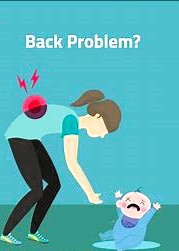+918048128529

This is your website preview.
Currently it only shows your basic business info. Start adding relevant business details such as description, images and products or services to gain your customers attention by using Boost 360 android app / iOS App / web portal.
Debunking Myths About Post-Delivery Back Pain [...

Debunking Myths About Post-Delivery Back Pain [Separating Fact from Fiction for New Moms] The joy of welcoming a newborn into the world is unparalleled, but for many new mothers, the experience can also bring a host of physical challenges, including back pain. While back pain following delivery is a common occurrence, it is often accompanied by a multitude of myths and misconceptions that can cause unnecessary worry and confusion. In this article, we will shed light on these myths and offer evidence-based insights to help new moms navigate the postpartum period with confidence and ease. Myth 1: Back pain is inevitable after childbirth. Reality: While it's true that many women experience back pain post-delivery, it is not an inevitability. Back pain can be managed and even prevented with the right care and attention. Maintaining good posture, gentle exercises, and seeking professional advice when necessary are crucial steps to minimizing back pain. Myth 2: Epidurals cause long-term back pain. Reality: Epidurals are a widely used method for managing pain during labor and delivery. While some women may experience short-term discomfort or soreness at the site of the injection, there is no substantial evidence to suggest that epidurals lead to long-term back pain. Myth 3: Caesarean sections (C-sections) always result in back pain. Reality: C-sections are surgical procedures that involve incisions in the abdominal wall, not the back. While some women may experience back discomfort during the recovery period, it is not a direct result of the surgery itself or spinal anaesthesia given during the caeserean. Proper post-operative care and rehabilitation can help minimize any discomfort. Myth 4: Breastfeeding causes back pain. Reality: While breastfeeding can lead to some temporary back pain due to poor posture or positioning, it is not the primary cause. Using supportive pillows and maintaining proper posture while breastfeeding can significantly reduce the risk of back pain. Myth 5: Back pain will disappear on its own. Reality: While some postpartum back pain may naturally resolve over time, persistent or severe pain should not be ignored. Ignoring back pain can lead to chronic issues. Seeking advice from a pain specialist, can be essential in finding effective relief and addressing any underlying issues. Myth 6: Exercise should be avoided after delivery. Reality: On the contrary, appropriate postpartum exercises can be beneficial for strengthening core muscles, improving posture, and reducing back pain. Consult with a pain specialist to create a safe and effective exercise plan tailored to your individual needs and recovery. Myth 7: Rest is the best remedy for postpartum back pain. Reality: While rest is essential for recovery, it is equally important to engage in gentle activities and exercises that promote circulation and muscle strength. Prolonged inactivity can lead to muscle weakness and exacerbate back pain. In conclusion, back pain following childbirth is a common occurrence, but it is not an inevitable burden that new mothers must bear. By dispelling these myths and understanding the realities of postpartum back pain, new moms can take proactive steps to manage their discomfort and enjoy a healthier, pain-free postpartum experience. Remember, seeking professional advice and maintaining a balanced approach to recovery are key to a smoother journey into motherhood. Dr Priya Rathi MBBS, MD, DNB, FCPM, FIAPM Chronic pain and spine specialist

